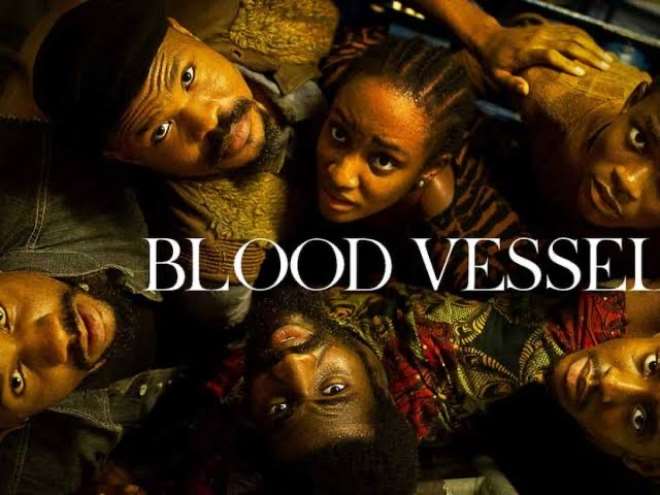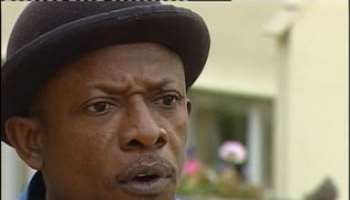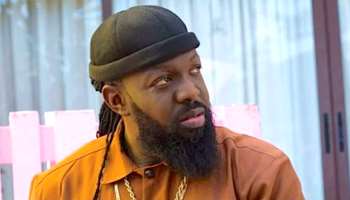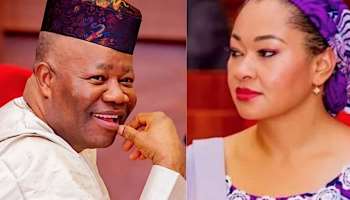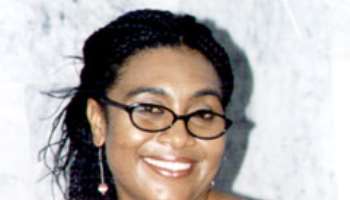Movie Review: Blood Vessel And The Nigerian Question Of Identity
'Blood Vessel is a how-to film on misrepresenting a people. It reminds of Hollywood's Black Hawk Down who made Sudanese appear and speak anything like Sudanese and Bruce Willis' Tears of the Sun which, apart from making neighboring Cameroon and the US seals the ultimate savior of the Igbo race, also gave Igbos a version of Igbo that sounded anything but igbo. It is therefore heartbreaking that indigenous filmwriters will align with Hollywood's mischievousness.
In a broader context, the identity hollowness of the film is a billboard advertisement as to why, as Nigerians, we must know ourselves a little more and that history has to return to our classrooms'
While the harmmattan is peaking and we all seem to be at a loss what to do with our lives this festive season, there seems to be a new bride in town that, quite honestly, snucke in on all of us: Netflix's Blood Vessel. A film set in the Nembe region of Niger Delta, in what we must assume to be present day (at least the creators of Blood Vessel gave us that liberty either by design or gaffe)
The film, directed by previously and constantly head-butted Moses Inwang follows the curious lives of six individuals, natives of Nembe who have mostly hard enough of the destructive indifference of multinationals operating in their area. The opening scenes are a bit paradoxical, an artistic triumph of fascinating clips of floating butterflies, oil spills, beautiful babies, poverty, 'olokpa' brutality, a young hand tearing through a woman's blouse and drone shots of the beautiful creeks of what we desperately try, but fail, to believe are parts of the Nembe Kingdom.
Of the Blood Vessel six, first comes Boma, a fraternal leader of sorts with imposing stature and heart to match, revolutionary but in vague courses. The first clue he is a revolutionary is when, disgusted, he turns to Abbey (David Ezekiel) and says 'I know what I fight...what do you fight for' In the course of the two-hour film, one may try to see what he fights for without grasping anything other than his obtuse thought he could get the multinationals out and save his land by throwing a few molotov cocktails on units of soldiers armed to the teeth. He didn't have the oratory of Hitler, the mobilizing skills of Mandela, the poetic followership of Alexandria and the craftiness of those, whether cynical or otherwise, who gun for change.
Enter Degbe, a gangster of too many words for a 2-eye-see. Apart from being Boma's ever 'capping' sidekick there isn't much to him asides unwittingly opening the movie to its first, inevitable blood shed.
The two following characters seemed to have their act together, at least they knew what they wanted and how to get it: to Jakpa and seek greener pastures on a ship, through the Atlantic, to Brazil aided by the films' most notorious Jakpa plug called Mr P. (Francis Duru)
The original Jakpa gang are two brothers Boms and his younger brother Tekena while Nollywood's reigning lovebirds, our very own Romeo and Juliet are Oyinbraekemi (Adaobi Dibor) and Abbey.
Their drive to Jakpa was as accidental and fierce as Oyinbraekemi father's violent opposition of their love affair and its resultant pregnancy which irks the old man even further.
The above characters, in pairs, will chance upon themselves while running from the rampaging Nigerian Army contracted to protect the fictional Axis oil at Nembe. Their fear, love and unyielding spirit will unite them in a common goal to seek for greener, safer pastures abroad in the base of a phsycho's ship streaking off to South America.
Now, the following are a sordid fundamentals.
ACTING/PLOT
In-between zig-zagging plots, incoherent themes and glaring structural may-days, there was problem of melodramatic acting instituted, probably, by the directors. The veteran acts at the fringes of the movie's cast seemed to be contained and truly veteran, their many screen years well tumbled before us.
The younger cast, especially the film's focused six showed innate skills but something seemed to be missing, perhaps it could be that the directors wanted an acting as humongous as their imagination of Blood Vessel's worth. The brutish Captain Phillips, sorry, scratch that, Captain Igor of Eastern Europe is the smart, meticulous antagonist we love to hate in movies until he begins to intimidate his own men, soberly breaking up with call-girls in what should be the heart of the Atlantic with a passport speedboat somehow always available to ferry them to land. Organizing a fight to the death in a cargo boat with charged atmosphere were enemy 'spies' are still on deathly prowl and, at his death, crying when he still had more than a fighting chance to save himself. Some of these gaffes can safely be attributed to sheer directorial incompetence.
INTELLECTUAL LAZINESS
As a Bayelsan Ijaw, going through the movie was painful. The Nembe people, culture, tradition, language and whatnot was placed on the chopping board of criminally thin research. It is forgivable the film wasn't shot at actual Nembe locations and had not a single Nembe cast, it is, however, hard to forgive that the filmmakers did not spend even three minutes on Google googling the Nembe Kingdom and the Ijaws. There are sufficient materials online to have guided against the language mismatch, historical inaccuracy and cultural appropriation that characterized the entirety of the movie.
The Nembe Language, a dialect of the Ijaw Language, is spoken predominantly in the Nembe Local Government Area and Brass Local Government of Bayelsa State. Although of same linguistic tree (Ijaw here as the mother tree), Nembe Language varies from the other dialects of Ijaw. Some of the variations are as distinct as German is to its near cousin, Dutch and English as well.
In this sense, sadly, non of the characters, including the blazing six, bears a Nembe name. Boma is Rivers Ijaw (Kalabari/Okrika axis) Same as Tekena (but you could find a few Nembe people bearing Boma and Tekena, and in that case it is usually out of respect to a friend or a distant, distant relative) Oyinbraekemi is never a Nembe name but more of the mien, Tarakiri and Western/central Ijaw generally. Likewise Degbe, Olotu, Ebieye and others. Abbey is rather an Ijaw pronoun for hey-you-man or hello for a male, the one for female being Ama. So, the name is seldom used as a name anywhere in Izon land.
In the first thirty minutes of reel time, the film achieved an orgasm of cultural inconsistency when Boma and Degbe, both supposed natives of Nembe, on Nembe soil, killed and ate a python that had somehow taken hold of a visibly possessed Tekena. In a bid to appear progressive and endear themselves to the worlds increasingly left leaning TV audience and industry, the directors constructed a taboo that was anything but possible in this earth.
Snakes and especially Pythons are revered in Nembe land, they are not hound down and slaughtered. They are rather welcomed with auspicion and celebratoryatmosphere. This culture is so strong Nembe people would rather be shot on their foreheads than to kill or eat a python. In the near impossible scenario a defaulter surfaces, such individual is instantly lynched and barnished for life. Elaborate spiritual cleansing would happen across the kingdom and the python will get a royal's burial. This is the most sacred of all Nembe traditions, spanning nearly a millennium, captured even in Wikipedia that hardly recognizes the divine. This is what these directors trivialized to a mere incident and a left-wing stunt to appeal Netflix's sensibilities of being unabashedly liberal, just like Hollywood and the other big screen companies. If the Nembe people should forgive them for dressing their natives up in entirely different clothings alien from the Nembe culture, they shouldn't forgive the python eating scene and must demand apology and reediting of subsequent copies of the film.
Another curious scene was Oyinbraekemi trying to tell some folklore to the other forlorn jakpaees when she suddenly delved on the inner strength of their people (i used 'their' because no one knew if the people were Ijaw or Igbo anymore) and how they would rather jump and drown in the Atlantic with their chains than slave away in plantations. The camera swirls to the past and her ancestors, Ijaws as was to be expected, began singing songs of sorrow in Igbo. The connection is puzzling. It didn't end there. An elderly lady, which we are to believe as Oyinbraekemi's grandmother, whose role in the film is under question, begins speaking feckless Igbo with Oyinbraekemi who communicates just as immaculately. This is the next scene of the flash back. It is barefaced cultural appropriation and cynical rewriting of history. Blood Vessel is a how-to film on misrepresenting a people. It reminds of Hollywood's Black Hawk Down who made Sudanese appear and speak anything like Sudanese and Bruce Willis' Tears of the Sun which, apart from making neighboring Cameroon and the US seals the ultimate savior of the Igbo race, also gave Igbos a version of Igbo that sounded anything but igbo. It is therefore heartbreaking that indigenous filmwriters will align with Hollywood's mischievousness.
In a broader context, the identity hollowness of the film is a billboard advertisement as to why, as Nigerians, we must know ourselves a little more and that history has to return to our classrooms.
ORIGINALITY
It fails heavily on this, Blood Vessel is as false as an eyelash. While it is clear the scriptwriters and those behind the story have apparent influences from Paramount Picture's Captain Philips (2013) a little background check confirms the movie is a plagiarism of Deadly Voyage (1996) released by the BBC and HBO and directed by John MacKenzie. Deadly Voyage is also about Africans seeking greener pastures abroad, a story that, to be intellectually fair to the crew of Blood Vessel, is quite clichéd and anyone, anywhere could have thought of such story.
Problem is some similarities are too striking to ignore.
1. The stowaways in Deadly Voyage fight the ship's crew, same happened in Blood Vessel.
2.The fight in Deadly Voyage ensued when the stowaways ran out of supplies and they came out of hiding to scavenge, same happened in Blood Vessel.
3. Such ships have rudders, why did the stowaways of Blood Vessel follow their Deadly Voyage counterparts into a basement?
4. The stowaways in Deadly Voyage are six, guess the number of stowaways in Blood Voyage...six
5. Deadly Voyage had just one female and that female was pregnant. Well, Blood Vessel also churned in their own pregnant female.
6.The crew in Deadly Voyage are Eastern Europens. Let's have three guess of the crew from Blood Vessel...China, No...Canada, No...last chance! Eastern Europe, bingo!
Pathetic.
What tries to salvage the film is the score, though there was no central theme which should have stuck to one's heart long after viewing, still the score in the first thirty minutes connected to the raw emotions the film's opening elicits. The picture, cinematography isn't bad and the camera sequencing is good. The subtitles are standard and the fact they actually rented a ship for the shoot (though little effort was made to show the aquatic beauty of Nembe land) is worth commending. The regular Nollywood movie would have shot in an hotel room and the imagination would have been left for us.
Blood Vessel's crew has potential for much greater films. They just shouldn't allow the innate ignorance and arrogance of capitalism get the better of them next time.
From this end, Blood Vessel is a 3/10.
JULIUS BOKORU is an award winning writer, journalist and critic. He lives in Abuja.
Latest News
-
 "If You're For Me, I Am For You" - Cubana Chief P
"If You're For Me, I Am For You" - Cubana Chief P -
 "3 Days To Go" - Femi Adebayo Urges Fans To Get S
"3 Days To Go" - Femi Adebayo Urges Fans To Get S -
 "Stop Asking Me Questions About Speed Darlington"
"Stop Asking Me Questions About Speed Darlington" -
 "Benue Is The Most Underdeveloped State I've Ever
"Benue Is The Most Underdeveloped State I've Ever -
 Stan Alieke Urges Young Professionals To Take Lin
Stan Alieke Urges Young Professionals To Take Lin -
 Chizzy Alichi Teases Fans With Baby Reveal, Promot
Chizzy Alichi Teases Fans With Baby Reveal, Promot -
 "I'm Not Wearing Makeup From July 4th Till Decemb
"I'm Not Wearing Makeup From July 4th Till Decemb -
 "Stop The Challenge Of Mocking Kids With Down Syn
"Stop The Challenge Of Mocking Kids With Down Syn -
 Regina Daniels Celebrates Sons As They Mark Birthd
Regina Daniels Celebrates Sons As They Mark Birthd -
 Speed Darlington Threatens To Sue NAPTIP For Defam
Speed Darlington Threatens To Sue NAPTIP For Defam


